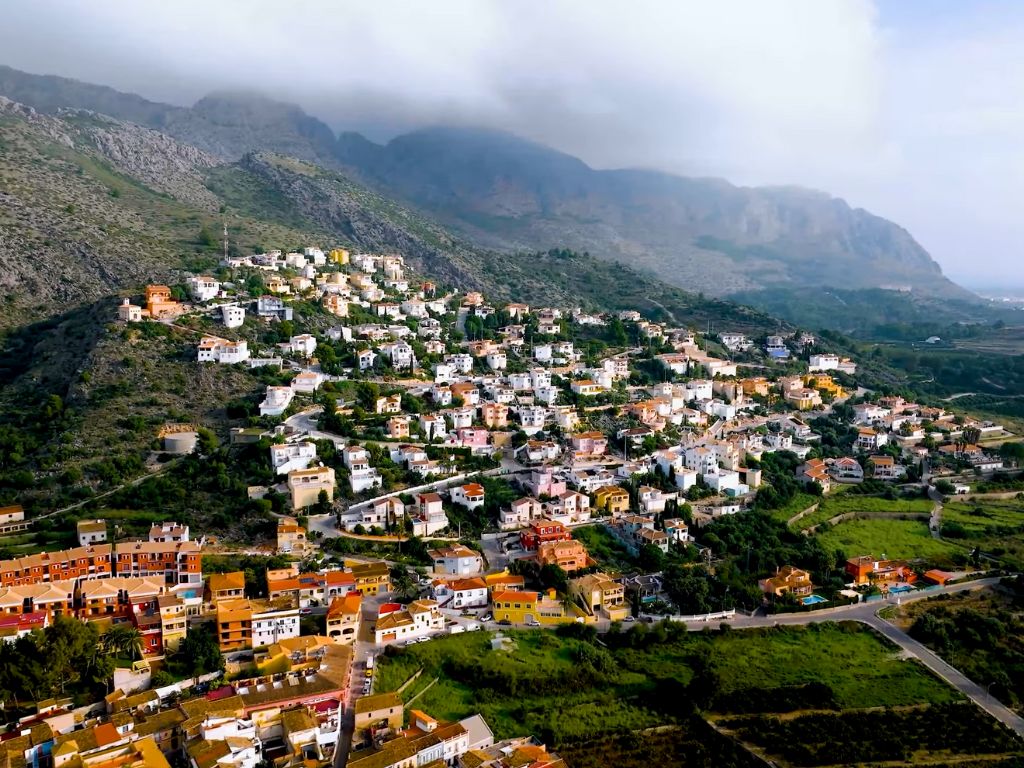Spain is a top choice for travelers globally, welcoming over 83 million visitors in 2019. With high safety concerns and the ongoing pandemic, many wonder about visiting. The big question is whether Spain is currently a safe travel destination.
For those who love to explore, feeling safe is key to fully enjoying a new place. Worrying about safety can spoil your adventure. So, getting the latest insights is essential for making smart travel decisions.
This article offers the latest on Spain’s travel safety. We’ll talk about avoiding scams and following COVID-19 guidelines. Our goal is to give you the info you need for a great and safe trip. Let’s see what’s important to know before heading to Spain.
Key Takeaways:
- Spain is generally a safe place to visit, but travelers should be cautious of petty theft.
- Common scams in Spain include the trileros scam and the Rosemary gift scam.
- It is recommended to keep valuables secure and be aware of your surroundings in crowded areas.
- Stay informed about the latest COVID-19 guidelines and restrictions set by the Spanish government.
- Research and understand the local customs and culture to have a more enriching travel experience.

Current Travel Guidelines and COVID-19 Updates
Heading to Spain amid the COVID-19 era means keeping track of new travel rules and bans. Right now, as of February 8th, 2023, the scene isn’t changing much. Here’s a summary of the latest developments:
Face Mask Rules
Spain has eased off on wearing masks. They are not needed on buses, trains, or the subway anymore. But you must still wear a mask in places like pharmacies and hospitals. Remember to always carry a mask and use it where it’s required.
Entry Requirements
For entry into Spain, guests must adhere to some rules to keep everyone safe.
Here’s what you can do to get in:
- Vaccination Certificate: You need a valid vaccination certificate to prove you’re fully vaccinated against COVID-19 for entry.
- Negative COVID-19 Test: If you’re not vaccinated, bring a negative test. This could be a PCR test within 72 hours or an antigen test within 24 hours of departure.
- Recovery Certificate: Another way in is with a recovery certificate proving you’ve gotten over COVID-19. This certificate should be within the past 180 days.
Kids younger than 12 don’t need the Spanish Travel Health Form. This form is for those not vaccinated. UK visitors, if vaccinated, don’t have to quarantine with the ending of Day 2 tests. Americans with proper vaccinations or negative tests are good to visit Spain.
Updated Face Mask Guidelines
Spain has made big changes regarding masks. They’re not a must indoors, but some places still need them, like hospitals. It’s crucial to follow what the local policies say about wearing masks.
To make sure you have the latest travel info, check the official Spanish government website. This way, you’ll be ready for any new rules or updates for your trip.
Image: A visual representation of travel guidelines and safety measures in Spain.
Current COVID-19 Situation in Spain

As of January 13th, 2023, Spain has an average of 110 COVID-19 cases per 100,000 people. They’re on the lookout for the Delta and Omicron variants. These are the main variants causing worry. However, Spain has managed the virus well. This has led to less disruption socially and economically than in some other places.
Spain stands out as one of the world’s top vaccinated countries. It’s fourth in the number of vaccinated people. Their high vaccination rates are helping the tourism industry bounce back. This is seen in more bookings and a hopeful future.
Local Variations and Guidelines
Keep in mind, rules can differ from place to place in Spain. Each region or city may have its own specific restrictions. Since keeping travelers safe is crucial, knowing the latest rules and following them is a must.
“Travelers are encouraged to regularly check the official Spanish government website for updated information and guidance relating to their destination. By staying informed, you can ensure a safe and enjoyable visit to Spain.”
The Road to Recovery
Spain’s tourism is slowly getting back on its feet. The country’s lively culture, beautiful scenery, and deep heritage draw in visitors. They offer a wonderful vacation experience.
Thanks to strong vaccination efforts and safety rules, Spain is working hard to protect everyone’s health. This shows Spain’s focus on making travel safe and fun. The goal is to offer a great time for those wanting to discover Spain’s many wonders.
If visiting Spain, remember to heed the local health advice. Wearing masks, washing your hands often, and respecting any rules in place is key. Doing this will let you enjoy everything Spain has to offer while staying safe.
Traveling to Spain: Tips for a Safe Experience

For a safe and fun Spain trip, follow these key tips:
- Keep valuables safe and avoid showing off wealth: Pickpocketing and theft are common, especially in crowded tourist spots and public transport. Leave important documents and extra cash locked in your hotel safe. Only carry what you really need.
- Stay sharp in crowds: Always be aware of what’s going on around you, especially when it’s busy. Pickpockets love crowded places because it’s easy to get distracted. Use bags with hidden zippers or money belts to keep your stuff safe.
- Choose safe ways to get around: Pick licensed taxis or well-known ridesharing services. If you’re driving, make sure you know the local driving and parking rules well.
- Know the local safety advice: Learn about the area’s safety rules and any warnings before you go. Look out for flags at the beach and signs that mark danger zones.
- Learn about Spanish customs and culture: It’s good to know a bit about how things are done in Spain. This will help you fit in and show respect.
- Learn some Spanish phrases: Knowing some basic Spanish will help a lot, even though English is usually understood in tourist spots. Simple words like hello, thank you, and sorry can make a big difference.
- Keep emergency numbers close: Save the numbers for local emergency services, your embassy, and your hotel in case you need them.
- Stay updated on travel advisories and COVID-19 info: Check for new travel advice from the CDC and the Spanish government. Stay up to date on entry rules, quarantine rules, and testing guidelines.
By keeping these tips in mind and being careful, you’ll have a great and safe time in Spain. You’ll get to enjoy its culture, natural beauty, and lively cities.
Vaccination and COVID-19 Measures in Spain

Spain is doing well in getting people vaccinated. Over 85% of its citizens have both shots by April 2022. Thanks to this, Spain is relaxing its COVID-19 rules. But, if outbreaks happen, they might need to add more rules.
Pfizer and Moderna vaccines are free for those who can get them. If you’re visiting Spain, make sure to follow the rules the government has for COVID-19. This will help keep you and others safe.
We all know masks help stop the virus from spreading. So, in Spain, you must wear a mask in some places. Always follow the rules on when to wear a mask, especially indoors or when it’s crowded.
Make sure you know the latest on traveling to Spain. The government might ask for a negative test or vaccine proof. Stay updated with what Spain asks of visitors.
Keep yourself in the loop with news and safety tips. This way, your trip to Spain will be both fun and safe.
COVID-19 Measures in Spain:
- Masks are a must in some places, especially indoors or when it’s crowded.
- Always follow special rules for entering Spain, like showing a negative test or vaccine proof.
- Check for the latest on what Spain wants from visitors.
Vaccination in Spain:
The government gives out Pfizer and Moderna vaccines for free. This is for people who qualify to get vaccinated.
Conclusion
Traveling to Spain is both safe and enriching. It’s key to stay aware and take precautions. Petty theft is a risk in crowded places. By keeping your belongings safe and staying alert, you can lower this risk.
COVID-19 guidelines are essential to follow. This means wearing masks in certain places. It helps keep everyone, visitors and locals, healthy and safe.
Spain is blend of rich culture, stunning landscapes, and pandemic resilience. It’s an alluring place for travelers. The country offers vibrant cities like Madrid and Barcelona.
It also has beautiful beaches on the Costa del Sol and Balearic Islands. There’s something for everyone here. Staying updated on travel advisories and following safety measures are important for a great journey in Spain.
Are you into relaxing on the beach, hiking in the Pyrenees, or enjoying Spanish cuisine? Spain has it all. It welcomes all tastes with open arms. With its top-notch attractions and focus on visitor safety, Spain remains a top choice for a memorable trip.
FAQ
Is it safe to travel to Spain right now?
Spain is generally safe to explore. Yet, travelers should be wary of pickpockets, especially in busy spots like stations. Store extra money and important documents in your hotel safe. Only carry what you need when you’re out. Locals warn about two common scams. One is the trileros scam, where a performer distracts while a pickpocket steals. The other is the Rosemary gift scam. Here, a Roma woman offers a gift to distract you from being robbed. Staying alert and following local advice will help ensure your safety in Spain.
What are the current travel guidelines and COVID-19 updates for Spain?
February 8th, 2023 marked updated mask rules in Spain. You don’t have to wear masks on public transport anymore. But, you still need to in certain places. This includes pharmacies and healthcare facilities, among others. To travel to Spain, either get fully vaccinated or show a recent negative test or recovery. Unvaccinated visitors must fill out a health form. Children under 12 are exempt. UK travelers who are vaccinated don’t need to quarantine back home. Spain now welcomes US visitors with the right certificates. For the latest on masks and other rules, keep checking Spain’s government website.
What is the current COVID-19 situation in Spain?
Spain saw 110 COVID-19 cases per 100,000 people as of January 13th, 2023. Cases mainly come from the Delta and Omicron variants. The country is handling the situation well, with a medium risk level. It ranks high in global vaccination rates. Spain’s approach has minimally impacted its economy and society. Be ready for varying rules by location and follow the local advice. The Spanish tourism industry is bouncing back.
What are some tips for a safe travel experience in Spain?
For a safe Spain trip, keep your valuables safe. Avoid showing off wealth. Be alert in crowded places. Use trusted forms of transport. Know the local safety tips and rules. Learn a bit of Spanish. Keep emergency numbers handy. Stay updated on travel advisories and COVID-19 updates.
What are the vaccination and COVID-19 measures in Spain?
Over 85% of Spain’s population is fully vaccinated as of April 2022. This is through the Spanish Vaccine Program. Spain offers Pfizer and Moderna vaccines for free. With more people vaccinated, restrictions have started to ease. Still, follow the current COVID-19 guidelines and any entry requirements.
Should I travel to Spain right now?
Yes, Spain can be a safe and fun place to visit. Just be cautious of petty theft and always keep your valuables secure. Follow the COVID-19 guidelines, including wearing masks in some places. By doing so, you can have a wonderful time exploring Spain’s beauty and culture. Spain has responded well to the pandemic, making it a great destination for those who love travel.
